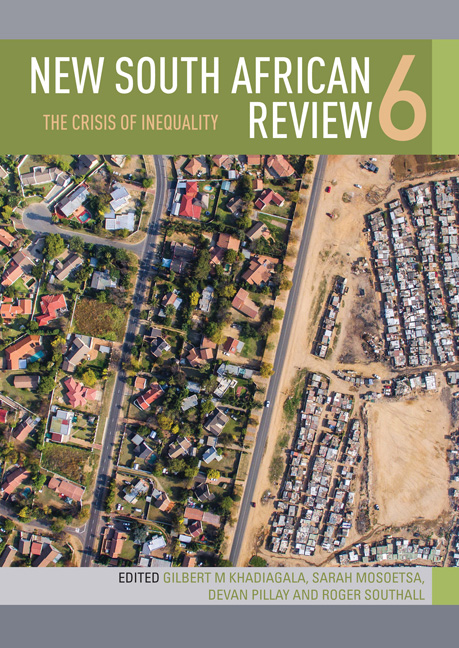Book contents
- Frontmatter
- Contents
- List of tables and figures
- INTRODUCTION: The global crisis of inequality and its South African manifestations
- PART 1 INEQUALITY AND CLASS: POLARITIES AND POLICIES
- PART 2 THE POLITICS OF INEQUALITY
- PART 3 SOCIAL DIMENSIONS OF INEQUALITY
- CHAPTER 8 Analysis must rise: A political economy of falling fees
- CHAPTER 9 Education, the state and class inequality: The case for free higher education in South Africa
- CHAPTER 10 Still waiting: The South African government's pending promise of equality for people with disabilities
- CHAPTER 11 Big fish in small ponds: Changing stratification and inequalities in small towns in the Karoo region, South Africa
- PART 4 LAND AND ENVIRONMENT
- Contributors
- Index
CHAPTER 11 - Big fish in small ponds: Changing stratification and inequalities in small towns in the Karoo region, South Africa
from PART 3 - SOCIAL DIMENSIONS OF INEQUALITY
Published online by Cambridge University Press: 23 March 2018
- Frontmatter
- Contents
- List of tables and figures
- INTRODUCTION: The global crisis of inequality and its South African manifestations
- PART 1 INEQUALITY AND CLASS: POLARITIES AND POLICIES
- PART 2 THE POLITICS OF INEQUALITY
- PART 3 SOCIAL DIMENSIONS OF INEQUALITY
- CHAPTER 8 Analysis must rise: A political economy of falling fees
- CHAPTER 9 Education, the state and class inequality: The case for free higher education in South Africa
- CHAPTER 10 Still waiting: The South African government's pending promise of equality for people with disabilities
- CHAPTER 11 Big fish in small ponds: Changing stratification and inequalities in small towns in the Karoo region, South Africa
- PART 4 LAND AND ENVIRONMENT
- Contributors
- Index
Summary
Small towns are anything but simple, despite the general media image of bucolic villages inhabited by gentle rustic folk living a slow and relaxed life. A small town may include as many social classes, categories, schisms and tensions as in any typical metropolis, but these fractious fragments are coalesced into a small population inhabiting a small area. People rub shoulders with people they like, or people they loathe, on a daily basis. Within these narrow spatial parameters, social classes develop even more subtle and powerful ways of keeping their distance from one another, or interacting on terms which both sides find congenial or tolerable. Small towns are polities in their own right; there are systems of decision making and resource allocation, and there are overt or latent tensions about the ways in which these functions are implemented. Complex ladders of social status serve to distinguish and separate different groups.
Small towns are also affected constantly and profoundly by their regional, national and international contexts. Some local people migrate to the cities to advance their education, and return with more skills and influence; other locals straddle town life and city life, juggling professions and livelihoods in several different localities. Many local townspeople use regional or city networks to advance their livelihoods and local influence. Some local people are adept at riding new international economic waves, adjusting to new opportunities such as game farming, tourism, retail or credit provision; other small-town people are hopelessly trapped within the narrow confines of the village.
This chapter explores the dynamics and prospects of different groups in the arid Karoo region of South Africa – a vast area of about eighty towns that makes up almost 45 per cent of South Africa's land surface. Based largely on my two decades of work and interaction in Karoo towns, the chapter suggests numerous social dynamics, simultaneously increasing and reducing inequality, and creating new forms of social cohesion and competition. These towns offer many opportunities for future social research.
DEFINING STRATIFICATION IN SMALL TOWNS
Small towns in South Africa differ greatly in their racial, ethnic and class profile. These towns were often shaped by their colonial origin, their role in apartheid planning, their economic function and their location near cities or in remote areas.
- Type
- Chapter
- Information
- New South African Review 6The Crisis of Inequality, pp. 200 - 216Publisher: Wits University PressPrint publication year: 2018



